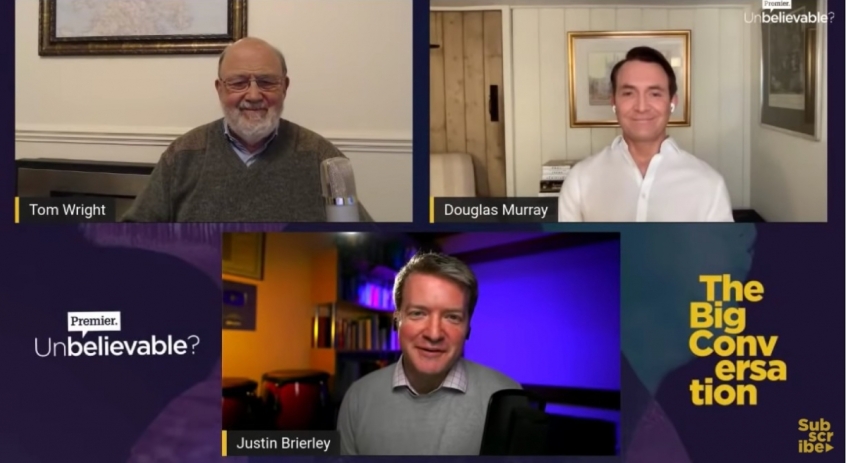
The Church is "falling into all of the latest tropes" when it should be preaching the Gospel, says British author Douglas Murray.
The author of The Madness of Crowds and former Christian said he felt an "irritation" at seeing the Church "giving up its jewels and becoming something else".
Murray made the comments in a conversion with theologian NT Wright hosted by Premier's Justin Brierley.
Describing himself as an "uncomfortable agnostic" and "disappointed non-adherent", he said he recognised the values and virtues the Christian faith has brought to British society, and that it was simply "wrong" to claim morality and basic ethics were self-evident.
"There has, in my view, been an interesting movement in recent years ... of people saying, well actually, if we go back and look at this, what we have and what we like does have roots in the Christian story," he said.
Despite being "outside of faith", Murray said he felt the "added discomfort" of being "a non-believer who is disappointed by the behaviour of a believing Church".
"Now many people think that's paradoxical but it isn't at all. I not only was brought up in, but afterwards sought the Church as it was and has been in England, and its jewels and gems of the King James Bible, the Book of Common Prayer, and much more," he said.
"And it's been my experience, as it has been for many other people .... that one has observed the Church giving up its jewels and becoming something else, and actually that irritation I feel ... about the Church hasn't gone away even while being outside it."
He said that any retreat from faith tended to end with religious bodies becoming "effectively a social action group".
"My fear is constantly [that] the Church is not doing what so many of us on the outside would like it to do, which is preaching its Gospel, to be asserting its truths and claims," he said.
"And so when one sees it falling into all of the latest tropes, one just thinks, well, that's another thing gone. It's just like absolutely everything else in the era, everything in its boring, monotone, ill-thought-out and shallow dialectic."
Responding, Wright said he could "very much understand" why Murray felt that way.
"I share his frustration when it appears the Church is simply jumping on the latest trendy bandwagon," he said.
"I totally agree the Church shouldn't just be jumping on the [latest] agendas, it should be exploring more what is in its own textbook."
Murray went on to say that the "most striking failure of the time" had been the attempt to replace the Christian ethic of equality in the eyes of God.
"Our age is struggling very badly with an attempt to replace that ethic or find another way to do it, and there are various ways which it's tried to do that - human rights ideology is one way, fairly developed but not successful, and the other is effectively the landing on equity as the answer when it can't be the answer.
"But I see what people are struggling to do, which is to try to maintain and hold onto this exceptionally important gift of the Christian inheritance.
"Without the idea of equality in the eyes of God and the value of every individual in the eyes of God, you are left with these attempts to assert that, for instance, everyone is the same or can be, and it's clear that we can't be and aren't."
Wright agreed, saying that from his point of view the only answer to this conundrum was "to go back to Jesus" and the Gospel.
"It's a renewal of human beings, not in order to be identicate 'oh, we're all equal now', but in order to be certainly equally valued ... and equally - though uniquely in themselves - part of an ongoing programme that God has launched, not human beings."
The New Testament scholar said the emergence of today's woke ideology was rooted in the moral drift from Christianity that started in the Sixties.
"When I was young we watched traditional morality go out the window. It was sex in the Sixties, it was money in the Eighties, 'we don't need to obey the old rules, we're going to do it differently, we're the modern world now,'" he said.
"And then what's happened is the invention of neo-moralisms, which is what the woke ideology is really all about and it reminds me [Roman Emperor Caligula] who put new laws up so high that nobody could read them and then blamed or punished people for not obeying these new laws that he'd just invented, and that's very much what's going on at the moment.
"Society can't live without morality but if you've banished all the older moralities, you've got to invent some more from the ground up and we're doing that on a very flimsy basis, it seems to me."
Murray agreed, but said there was an "added cruelty if you haven't even finished writing them yet and you tell people to 'get with them'."
"What are the rules here? The Christian ethic has a set of rules. They can be debated around endlessly as everyone knows, but there are foundations to them, you cannot deny. They are not wholly abstract," he said.













